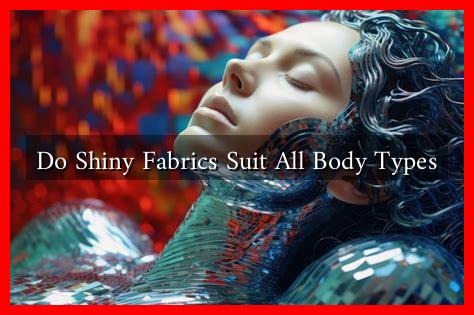-
Table of Contents
Do Shiny Fabrics Suit All Body Types?
Shiny fabrics have long been a staple in the fashion industry, often associated with glamour and sophistication. From sequined dresses to satin blouses, these materials can elevate an outfit and make a bold statement. However, the question remains: do shiny fabrics suit all body types? This article delves into the characteristics of shiny fabrics, their impact on different body types, and how to wear them confidently.
The Allure of Shiny Fabrics
Shiny fabrics, such as silk, satin, and sequins, are known for their reflective qualities that catch the light beautifully. They can enhance the visual appeal of an outfit, making it more eye-catching. However, the way these fabrics interact with the body can vary significantly based on body shape and size.
Understanding Body Types
Before determining whether shiny fabrics suit all body types, it’s essential to understand the different body types. Generally, body types can be categorized into the following:
- Apple Shape: Characterized by a larger upper body and narrower hips.
- Pear Shape: Defined by wider hips and a smaller upper body.
- Hourglass Shape: Balanced proportions with a defined waist.
- Rectangle Shape: Similar measurements for the bust, waist, and hips.
- Inverted Triangle Shape: Broader shoulders and a narrower lower body.
How Shiny Fabrics Interact with Body Types
Shiny fabrics can enhance or detract from an outfit depending on the body type. Here’s how they interact with various shapes:
Apple Shape
For those with an apple-shaped body, shiny fabrics can draw attention to the upper body. To balance proportions, opt for shiny fabrics in the lower half, such as a satin skirt, while keeping the top in a matte finish.
Pear Shape
Pear-shaped individuals can benefit from shiny fabrics on the upper body. A sequined top paired with a solid, darker bottom can create a balanced look, drawing attention to the face and neckline.
Hourglass Shape
Hourglass figures can wear shiny fabrics confidently, as they accentuate curves. A fitted, shiny dress can highlight the waist while showcasing the body’s natural shape.
Rectangle Shape
For rectangle shapes, shiny fabrics can add dimension. Consider a shiny belt or accessories to create the illusion of curves. A shiny top with a structured blazer can also add shape to the silhouette.
Inverted Triangle Shape
Inverted triangle shapes should focus on balancing their broader shoulders. A shiny bottom, like a sequined skirt, can help draw attention away from the upper body while adding flair to the outfit.
Tips for Wearing Shiny Fabrics
To wear shiny fabrics successfully, consider the following tips:
- Choose the Right Fit: Ensure that the garment fits well to avoid any unflattering pulls or gaps.
- Balance with Matte Fabrics: Pair shiny pieces with matte fabrics to create a balanced look.
- Accessorize Wisely: Use accessories to draw attention to your best features while keeping the overall look cohesive.
- Consider Color: Darker shiny fabrics can be more forgiving and slimming, while lighter colors can highlight areas.
Case Studies and Statistics
A study conducted by the Fashion Institute of Technology found that 70% of women feel more confident in outfits that flatter their body type. This statistic underscores the importance of choosing the right fabric and fit. Additionally, many fashion influencers have embraced shiny fabrics, showcasing how they can be styled for various body types. For example, influencer Aimee Song often pairs shiny skirts with oversized sweaters, demonstrating how to balance proportions effectively.
Conclusion
In conclusion, shiny fabrics can suit various body types, but the key lies in understanding how to wear them effectively. By considering body shape, choosing the right fit, and balancing with matte fabrics, anyone can incorporate shiny materials into their wardrobe. Remember, confidence is the best accessory, and when you feel good in what you wear, it shows. For more tips on styling shiny fabrics, check out [this guide](https://www.example.com) for additional insights.

